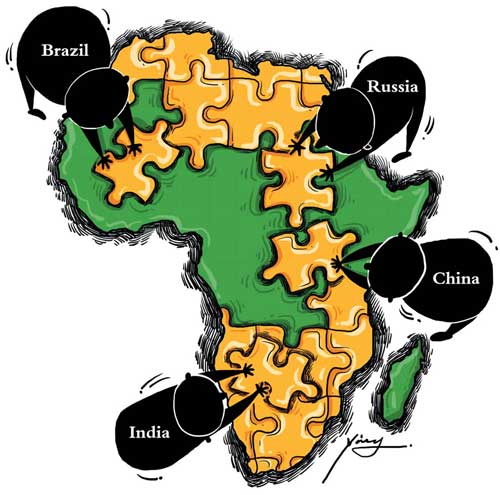 |
On May 11, 2000, The Economist magazine dubbed Africa "the Hopeless Continent" due to its lackluster economic performance, in a feature article titled "Hopeless Africa".
However, in the decade following the publication, Africa has experienced an economic revival with its combined GDP growing at an average rate of 4.5 percent per annum, thus making Africa one of the fastest-growing economic regions in the world.
Trade and investment have played an important role in Africa's economic revival. In recent years, there has been a gradual shift away from trade between African and Western economies toward increased level of trade between Africa and the BRIC (Brazil, Russia, India and China) economies. Africa-BRIC trade is characterized by Africa supplying BRIC economies with natural and mineral resources, to fuel the latter's rapid industrial expansion in exchange for infrastructural development in various projects including railways, roads, hydroelectric power stations and dams.
According to the Standard Bank Group, trade between BRIC nations and Africa increased almost eight times from $21.9 billion (15.2 billion euros) in 2000 to $164.6 billion in 2008, and it is expected to exceed $4 trillion by 2030. In 2010, China overtook the United States as Africa's largest trading partner, while Brazil and India currently rank as Africa's sixth and 10th largest trading partners, respectively. Among the BRIC countries, China dominates BRIC-Africa trade, accounting for about two-thirds of the trade.
The increased level of BRIC-Africa economic engagement has brought several benefits to both parties. This includes infrastructure development, economic expansion and developmental aid for Africa, while the BRIC nations have benefited from access to strategic mineral resources, market access and support from African states at multilateral summits.
As the BRIC countries and Africa continue to reap the benefits of bilateral trade, a number of initiatives such as the Forum on China-Africa Cooperation and the India-Africa Forum Summit have been put in place to foster friendly economic cooperation. There has also been a number of high-profile visits by officials from BRIC economies to Africa. In December 2010, the BRIC countries invited South Africa to join the grouping.
However, despite the increased level of economic engagement and various initiatives to foster harmonious economic cooperation between Africa and the BRIC nations, there have been instances of rising tension and conflict.
Having experienced the ills of colonialism and imperialism in the hands of Western economies, Africans are apprehensive of experiencing exploitation in the hands of the new emerging super powers. Consequently, the increasing economic engagement between the BRIC countries and Africa has resulted in rising tension and claims of exploitation with a number of Africans describing the BRIC economies as the new neo-colonialists. Thabo Mbeki, the former South African president, described China's quest for mineral resources in Africa as a "new form of neo-colonialist adventure". Others have described the BRIC countries' incursion into Africa as the new scramble for Africa.
These conflicts have manifested in various forms. There were protests in Zambia as a result of the death of 50 mine workers in an explosion that took place at the Chinese owned copper mine in Chambishi, which occurred due to lax safety standards. In Nigeria, union members kidnapped 11 Indian steelworkers in 2007 over a pay dispute. There have also been complaints in Gabon and Ghana by environmentalists over the prospecting activities of the Chinese company Sinopec at the national parks.